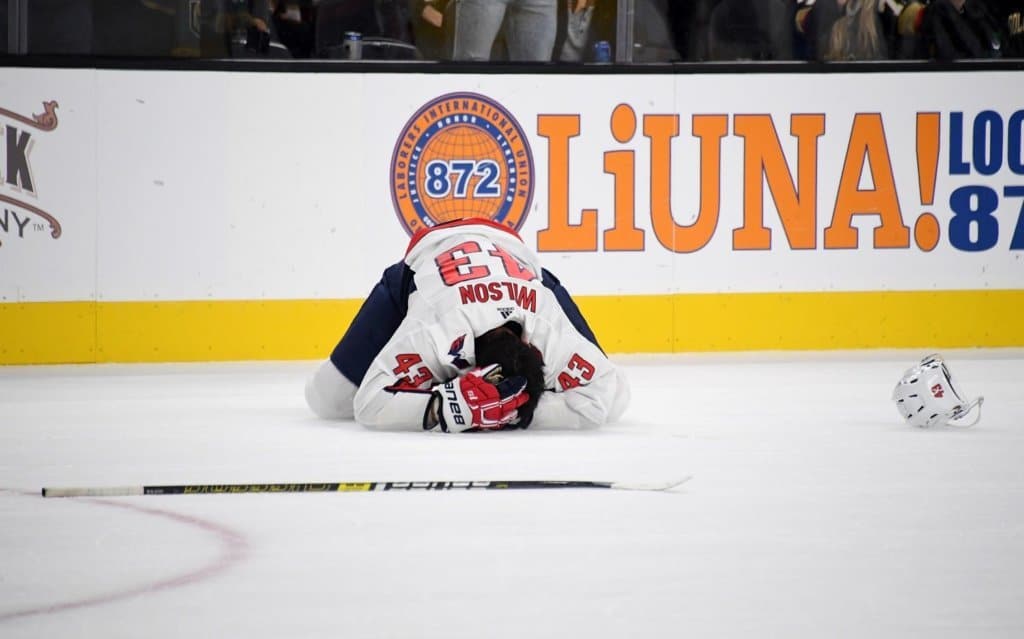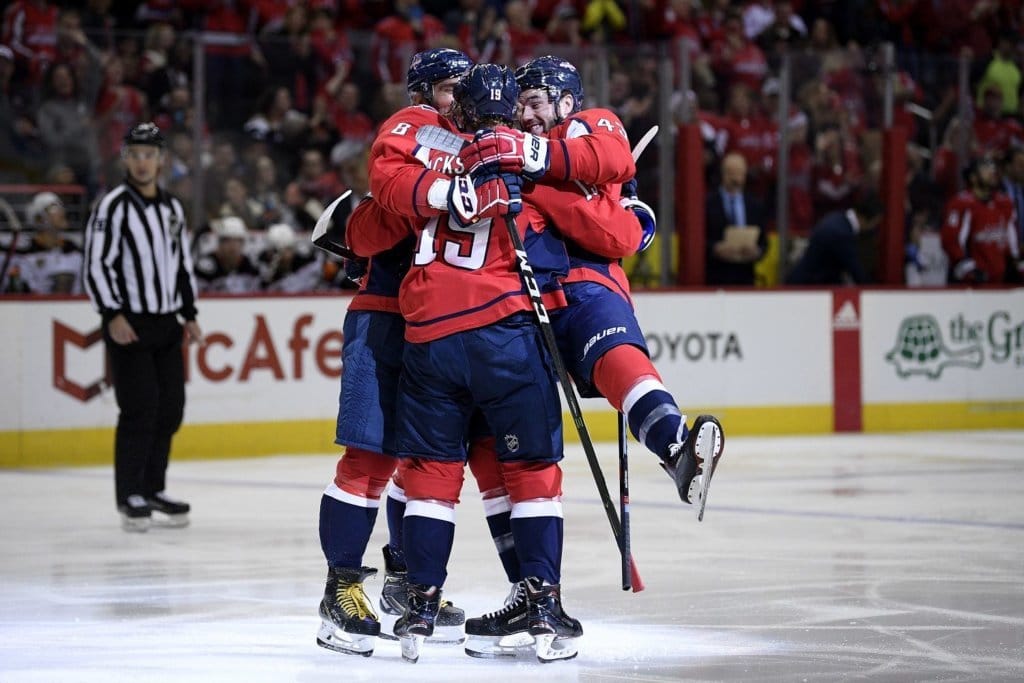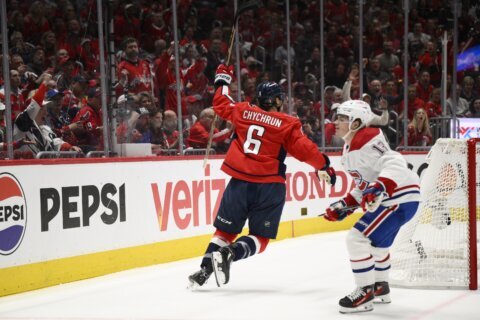WASHINGTON — Some of Tom Wilson’s teammates can’t help themselves. After seeing Wilson play some of the best hockey of his career this season, they are liberally tossing out comparisons to Hall of Famers.
“Right now, he’s like Eric Lindros,” Alex Ovechkin said recently. “He can play hard, score goals and make big assists.”
The verbal bouquets don’t stop there.
“His presence on the ice, he’s one of those Mark Messier, Jarome Iginla-type guys,” said defenseman Madison Bowey.
“Everyone knows when he’s out there. He can hurt you any way. He skates hard, he backchecks, he’s first on the forecheck, and he can shoot the puck and score. I think he’s just an all-around complete player and an all-around presence on the ice that we really missed.”
There is no denying that the Capitals have been vastly improved since Wilson’s season debut on Nov. 13. The Caps entered that game with a modest 7-6-3 record after Wilson missed the start of the year due to a suspension.
Soon after the Capitals’ final game without Wilson — a listless 4-1 loss at home against Arizona — defenseman John Carlson described the club’s play as “very blah.”
Two nights later, Wilson returned and the Capitals have since won eight of 11 games. Wilson has eight goals and 14 points over the 11-game stretch. He has also been a fixture on both special teams’ units and recently scored in a career-high six consecutive games.
“He’s such a big part of our team, of the way we play and the culture both on and off the ice,” said T.J. Oshie. “We were missing something (to start the season) and that was number 43. He’s a presence on the ice.”
***

The Capitals could be missing that presence again when they visit the Arizona Coyotes on Thursday (9 p.m.; WFED 1500AM). Wilson suffered an upper-body injury against Vegas on Tuesday and did not return. Filling the void when Wilson was out to start the year proved a challenge.
Just ask head coach Todd Reirden, who went through a revolving door of top-line right wingers with Wilson unavailable for the first six weeks of the season.
By early November, five different players had been given a shot to skate alongside Ovechkin and Evgeny Kuznetsov in Wilson’s stead. While each of the five wingers showed flashes, none could check all of the boxes that the versatile Wilson brings to the lineup.
“Those can be big skates to fill,” said Devante Smith-Pelly, who made a brief cameo appearance on the top line when Wilson was out.
Wilson is a rare talent. The 6’4”, 218-pound winger possesses a unique blend of speed and strength, along with defensive savvy and the ability to finish offensively. He is also incredibly popular among his teammates and is frequently lauded for his leadership. It is widely believed he will soon have a letter stitched on his sweater and that he could one day succeed Ovechkin as the Capitals’ captain.
While the Capitals are loaded with high-end talent in Ovechkin, Nicklas Backstrom and Kuznetsov, Wilson provides a blue-collar, physical element that few on the team can replicate. He has learned, over the years, how to use that strength not just to deliver bone-crunching hits — more on that in a moment — but to create space for his teammates and to win puck battles along the boards and below the goal line.
“He brings a lot of determination and energy hunting down pucks and pressuring people,” said defenseman Matt Niskanen. “Every year he’s been in the league his skill has gotten better and better, and he’s developing a bit of a scoring touch. He kills penalties, he’s obviously physical — everybody knows about that — but he’s just really good at pressuring people and getting turnovers.”
Wilson is constantly evolving. As a 19-year-old rookie, he was as a fourth-line grinder on a team that missed the playoffs. Four years later, he emerged as a key cog on the first line for the Stanley Cup Champions.
Along the way, Wilson has made adjustments that have allowed him to move up the depth chart. He’s emphasized speed and conditioning during his offseason training so he could play top-line minutes without tiring. He’s worked privately with skills coaches to help fulfill his offensive potential. Two years ago, he began penalty killing. This year, he’s also been on the power play.
While Wilson’s on-ice maturation has been gradual, the Capitals have long felt they had a unique talent. That’s why they were comfortable handing him a six-year, $31 million contract last summer. The commitment to a player that has yet to hit 20 goals or 50 points in a season raised a few eyebrows, but internally the Capitals believed that Wilson would continue to evolve and reach another level.
“It’s fun to watch him be able to contribute in different ways,” said Reirden. “He’s just so valuable to us in terms of what he can do offensively. He’s in on the forecheck and he changes the momentum of games by bringing the energy that he does. Talk about leaders in the room — he’s one of them. I can’t put a value on how important it is having him back.”
If Ovechkin and Backstrom are the faces of the franchise, Wilson, it’s been said, is the heartbeat. He’s shown an ability to provide a jolt for the entire team, as evidenced by his mid-November return in a 5-2 win in Minnesota.
By the end of the first period, he already had his first goal of the season after driving to the net and scoring from atop the crease. By the end of the second period, he had his first fighting major. By the end of the third, the Capitals had earned two points against the Wild. It was quintessential Wilson.
“He’s a big-bodied guy that nobody likes to play against,” said Capitals assistant coach Scott Arniel, who saw plenty of Wilson during his five years as an assistant coach with the Rangers.
“He’s a force to handle out there because whether he’s driving to the net, or he’s battling in front of the net, he’s going to play with a little bit of an edge. He’s just a hard guy to play against and he gives us a big spark.”
***

Because this is already Wilson’s sixth full NHL season, it’s easy to forget that he’s still only 24 years old. His game continues to grow, along with his ice time and responsibilities. Despite leaving two games prematurely this season — once due to a match penalty and once due to injury — Wilson is averaging 19 minutes and 34 seconds of ice time per game. That is more than three and a half minutes north of the 15:59 he averaged per game last season.
“Every player wants more minutes,” Wilson said. “You get more time with the puck, you get more looks. Whether I’m with Ovi and Kuzy or I’m with Ovi and Backy, it’s going to be two of the best players in the world, so when they have the puck, that’s good news. So, for me, I need to get them the puck, I need to get in on the forecheck, create space for them, go to the net, create a little bit of havoc and energy. Ovi has a unique style, he’s a run and gun electric offensive threat, so it takes a little getting used to playing with him, but I think I’ve got it down.”
Wilson was on the top line throughout last spring’s Stanley Cup run, proving tremendously valuable with five goals and 15 points in 21 games. In addition to finding a home on the No. 1 line, Wilson also emerged as a key cog on the Capitals’ penalty killing unit.
The Capitals PK has seen a big improvement since Wilson returned. Washington went 43-for-60 (71 percent) in short-handed situations before Wilson returned; the PK is 34-for-41 (83 percent) since.
“He’s very responsible,” said goalie Braden Holtby. “You can tell that our defensive game (has improved( since he came back and he has the ability change a team that way. He’s obviously chipping in offensively too, but his complete game brings energy and brings a level of accountability throughout our whole lineup. He leads by example.”
The captain himself has also been impressed: “He’s one of the leaders on the team,” Ovechkin said. “He brings energy, he brings toughness and I think when he’s on the ice, the (opposing) team gets a little bit afraid because he’s a big boy and he can hit.”
***

And therein lays the next step in Wilson’s evolution. Wilson has been suspended four times since September 2017. Although his most recent suspension was reduced from 20 games to 14, it was a clear message that Wilson needs to reign in it. It’s a delicate balance for a power forward who can do a lot of things well, but can deliver punishing hits better than most.
The consensus around the Capitals is that Wilson can still be physical and deliver hits when appropriate, but he needs to be smarter when it comes to picking his spots.
“Unfortunately now, there’s a lot of attention on the physical play, but he adds a lot of different things to our team,” Reirden said. “Maybe if he’s not quite as physical in times of risk, I don’t think it’s going to hurt his overall production and definitely not hurt our overall team because he can do a number of things to help our club.
“I think it’s a line that needs to be towed with him in regard to he has a physical element that is a difference maker for him and using it at the proper times and in the proper ways.”
Wilson has made a cognizant effort to ease up in some instances if an opponent is in a vulnerable position, but as evidenced by his hit on New Jersey’s Brett Seney last Friday, which resulted in a five-minute major penalty and an ejection, Wilson isn’t likely to receive the benefit of the doubt.
“That’s the reality of it,” Wilson said. “Anytime I’m involved in contact it’s assumed that I’m skating away and that’s a match penalty. It sucks but that’s what it is. I just have to keep trying to play my game and produce and help the team win. As we saw, I have to be very, very careful about any type of contact.”
According to Ovechkin, Wilson’s physical game is welcome, but his all-around game has become increasingly valuable.
“He’s grown up as a player,” Ovechkin said. “I think he’s realized the game of hockey is not just about hitting people. It’s about making plays. And then if you have a chance to hit, why not? He’s grown up as a person and as player and he’s gotten better.”
As he finds that balance, Wilson also appreciates the importance of simply remaining in the lineup each game.
“At the end of the day, missing 15, 16 games can’t happen,” he said. “At the end of the day, it’s on me, and I have to control that better and make sure I’m out there playing.”





